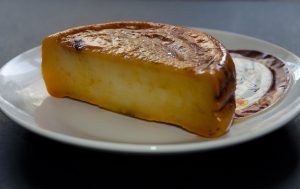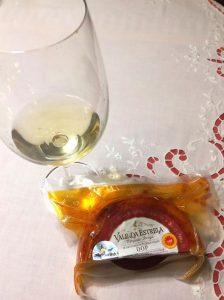WINES FOR CHEESE “SERRA DA ESTRELA VELHO”

The winemaker Virgílio Loureiro made a tasting of the Vale da Estrela Mature PDO Cheese and recommends wines that are in “complete consonance” with the Serra da Estrela Mature Cheese.
The choice of wines to accompany cheeses, or any other food, is not consensual nor supported by rules of unquestionable scientific basis.
The old popular saying: “Tastes are not discussed” confirms this clearly.
However, I always like to add something more to the saying, stating: “Tastes are not discussed, but educated”.
This educational process involves being attentive to the sensations that cheese and wine provoke in us when we enjoy both. If the cheese is very good and the wine too, the result is always satisfying, but when we taste it carefully we realize that sometimes the result is not as satisfying as we had hoped. Other times, when the wine choice is perfect, both cheese and wine taste better than isolated.

Serra da Estrela Mature PDO Cheese
Cheese Characteristics
Before talking about the wines for Serra da Estrela Mature Cheese, it is important to talk about this remarkable cheese matured from raw sheep’s milk and its main characteristics.
One of the most important is its intense and penetrating odor, which makes the taste buds salivate and makes those who don’t like cheese flee.
The other essential feature is its strong flavor, where the soft and slightly granular texture stands out, the salty and spicy notes, which linger in the mouth for a long time, and the complex aroma, which fascinates connoisseurs.
With these particularities, the matured cheese fills the mouth with strong flavors and aromas and causes some aggressiveness on the palate, forcing the greatest attention to be paid to the choice of wine to accompany it. It is for this reason that a sweet accompaniment, such as jam or fresh fruit, is usually placed on a cheese board, which serves to cleanse the palate and reduce the intensity of flavours. However, when you accompany the cheese with wine, it is no longer necessary to place the jam on the board, as the wine has the same function.
It is now understood that the most important rule to bear in mind is to prevent the wine from attacking the palate or enlivening the aggressiveness of the cheese’s flavors. Wines with a very intense flavor, with a high alcohol content and somewhat astringent, such as young and very tannin reds, are not recommended, contrary to what many people think, convinced that a strong cheese should be accompanied by a strong wine. If we taste it carefully, we will notice that it leaves a bitter taste in the mouth due to the intensification of flavors that the salt in the cheese causes in the taste of the wine. The astringency of the tannins will also collide with the cheese proteins, causing an unpleasant sensation (let’s not forget that, in the tanning industry, tannins are used in large quantities to treat the proteins of the skins, in a reaction similar to that of the cheese proteins with the red wine tannins in our mouth).

Vale da Estrela mature cheese with Dão wine
The style of wines
It is therefore understandable that, to counter the aggressiveness of the intense flavors left on the palate by the cheese, one should resort to soft, aromatic wines or sweet wines, preferably with aromatic complexity, such as many whites or sweet liqueurs, white or red.
For the harmony of flavors to be ideal, it is important to take into account the style, which is much more important than the brand, the year of harvest or the region where the wine is produced. Let us analyze in more detail the style of the recommended wines.
The white wines
Among the young whites, dry ones that are not excessively acidic are preferable, such as those from aromatic varieties, which give the wines floral and fruity notes.
The “sweet” sensation that the floral aromas of the wine provoke contrasts in the best way with the salty and spicy cheese. Examples of this style are Dão wines made from the Malvasia-Fina variety, those from Beira Interior from Syria or Fontecal, those from Minho from Alvarinho or Loureiro, those from Bairrada by Maria Gomes, those from Ribatejo from Fernão Pires and those from Alentejo from Antão Vaz or Syria. Other whites suitable to accompany Serra da Estrela Mature cheese are those fermented in oak barrels, which have an unctuous texture, with the acidity disguised by the wood and with enough body to face, without harming the palate, the strong flavors of the cheese. Also recommended are the so-called “late harvests”, usually made with very sweet white grapes that, after fermentation, have residual sugar and very complex aromas. Finally, there are the old whites, particularly those from Dão made with Encruzado, Cercial or Bical, whose extreme aromatic complexity creates a perfect dialogue with the aromas and flavors of the cheese.
The red wines
For the reasons already explained, red wines are not very recommended to accompany Serra da Estrela Velho cheese, but for the unfailing adepts who do not dispense with them, it is also possible to suggest some.
The basic rule in your choice is to avoid those that have a high concentration of tannins and are very acidic. Therefore, wines with little color, light, little acid and with a slightly sweet finish are the most recommended.
The liqueur wines
Liqueur wines have always been considered the ideal companion for strong cheeses, such as Serra da Estrela Mature. However, not all are recommended. Sweet wines, which contrast brilliantly with the flavor of the cheese, are ideal. As Portuguese liqueur wines are recognized as among the best in the world, it is important to detail their relationship with matured cheeses made from raw sheep’s milk. Among Port wines, tawnies with some age are especially recommended, preferably over 10 years old, both white and red. The aging process they undergo removes most of their tannins and gives them an enormous aromatic and flavorful complexity, which creates a surprising harmony with the cured cheese. “Vintage” and “late bottled vintage (LBV)” ports are not so recommended, especially when they are young, given their astringency, caused by their high concentration of tannins. Muscat, from Setúbal or Douro, are also illustrious companies of matured cheeses, especially when they have aged for more than 10 years. Finally, Madeira liqueurs, although less known and more acidic than the previous ones, are excellent to accompany these cheeses, especially the sweet and old ones, from the Malvasia and Boal varieties.
The moment to serve each wine
The fact that there are so many and varied wines to accompany the matured sheep’s cheese makes it necessary to take into account the times when the different styles should be served. Dry wines, white or red, are recommended to accompany cheese in a light meal in the late afternoon. They can also be served with meals, but not as a dessert. Therefore, they are usually served as a pre-dessert, in the French way, followed by a sweet or fruit. When the cheese finishes the meal, it should always be served with a sweet wine, preferably liqueur, and the older the more refined the moment.
The complete harmonization
Choosing the right wine to accompany your cheese can take on many facets. The simplest, and most commonly used, only takes into account the sensory harmony between cheese and wine. However, there are other harmonies that go beyond physical pleasure. Thus, it will not be a perfect choice to opt for an industrial wine to accompany a cheese as traditional, refined and produced in such an artisanal way, such as Serra da Estrela Mature. Respecting production styles and harmonizing them elevates the choice of wine to the pleasures of the spirit. In the same way, opting for wines from the cheese production region, both from Dão and Inner Beira – some of them perfect companions for cheese – is to enhance the choice and give pleasure to the spirit. A great old white from Dão accompanied by an improved Serra da Estrela Mature cheese is a pleasure for the senses and a treat for the spirit of person from Beira, as both are masterpieces of Portuguese gastronomy and culture born in their land!
Virgílio Loureiro
